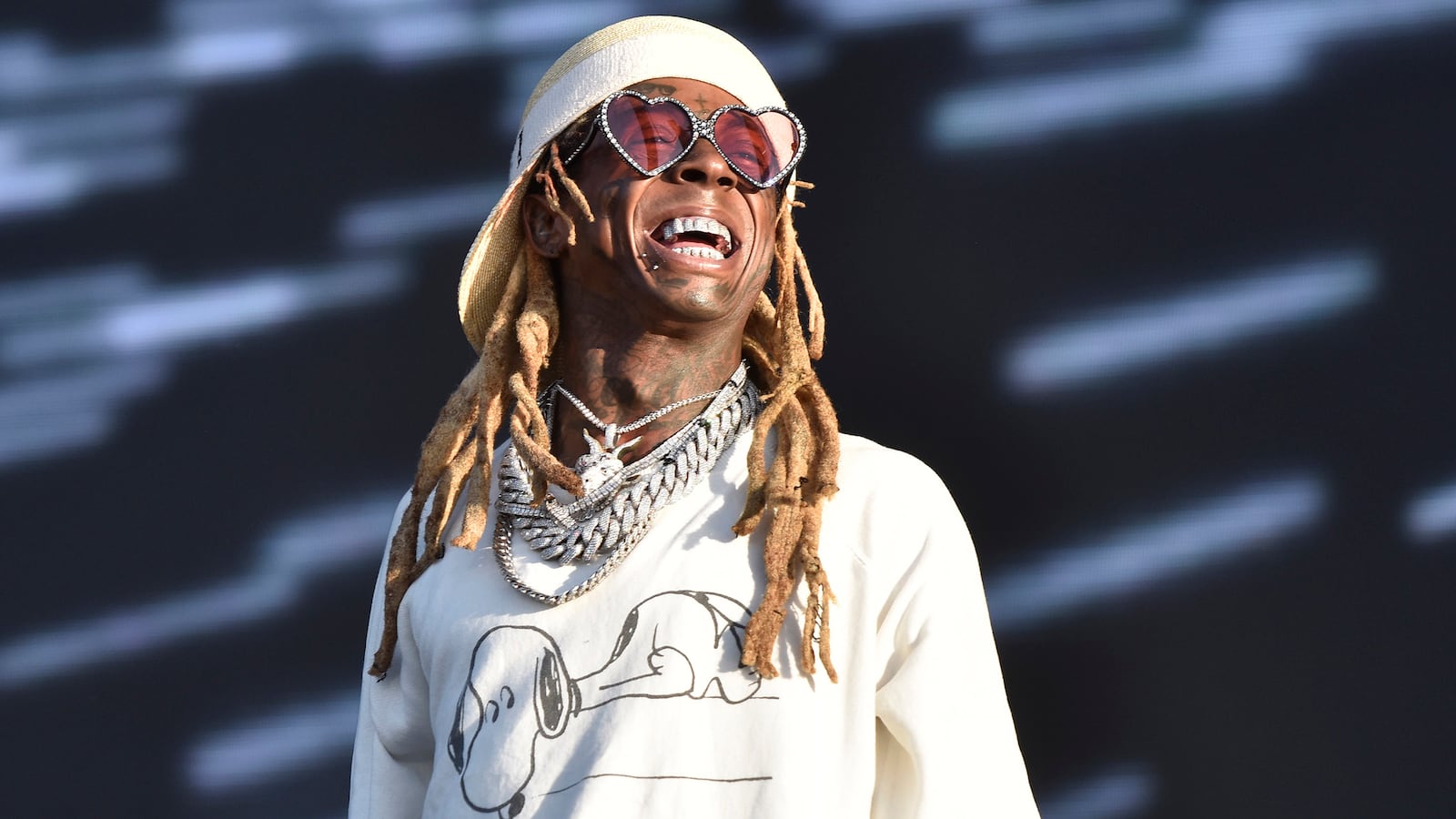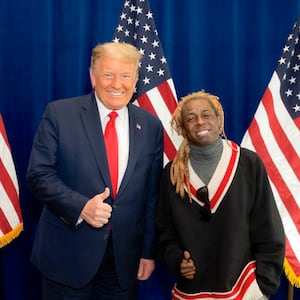Long before Donald Trump got into politics and struck a hard bargain with U.S. voters to enable their racism, sexism, and xenophobia in exchange for a brand boost to save his bumbling empire, he’d been cutting deals and playing shell games with Black entertainers to profit off of their celebrity and, after his hustle somehow landed him in the Oval Office, rappers have come before his clown court jury of one in the hopes that they, too, could taste ungainly power. That’s how Lil Wayne and the Donald ended up side-by-side in October, American flags behind them, thumbs up and smiling.
And on Wednesday, the last day of his presidency, Trump pardoned the rapper, who’d pleaded guilty to felony possession of a firearm after trying to take a gold-plated handgun onto a private jet. It was Lil Wayne’s second gun offense and, before his pardon, he’d been due back in court at the end of the month and was facing as long as a decade in prison. Trump also commuted the sentence of the rapper Kodak Black, who’d been in prison for making a false statement to purchase a gun and has detailed the abusive conditions he’s faced there, and, after Snoop Dogg lobbied for it, the sentence of Michael “Harry-O” Harris, the Death Row co-founder who’d been locked up for 32 years, spending many of them as a prison reform activist.
Lil Wayne, though, unquestionably the top name on the hip-hop pardons marquee, doesn’t purport a political stance so much as he promotes a value system already endemic to rap: get rich and live trying. If he had a party—he doesn’t—the tagline would be “it ain’t trickin’ if ya got it,” a nod to how much money, and the promise of it, moves the needle much more than a concern for broad policy change. Dwayne Carter is an exceptional songwriter, pumping out hit after perennial hit since his early teens and on pace to be one of our nation’s most prolific talents. Trump has failed himself through six bankruptcies now and, for his grand finale, will be the twice-impeached, civil war-provoking dunce who stains an already ink-blotted history. The greatest inversion here is that Lil Wayne is no criminal just like the president is no statesmen. That this pock-marked, felonious commander-in-chief held the power to exonerate is a joke and a national crisis in one.
Although Lil Wayne of course shouldn’t be held up as a representative of all Black political thought, he’s been cited for his personal lyrics addressing the Black underclass (check the song “Georgia...Bush” from his mixtape Dedication 2), the tightrope walk between medicated mental health and death (“I Feel Like Dying” from The Drought Is Over 2, and love of wealth (every song he’s ever made). He is a kid from the 9th Ward who made good on his drive and got himself and his family out of the hood. He has range; he is complex. Still, his 2016 interview Nightline with Linsey Davis revealed how racial politics haven’t been in his foreground for some time. He’s spent his adult life in the lap of luxury, caressed by fame and adulation. In the telling remarks, Weezy conflated the Black Lives Matter movement with his individual success story in music, saying, “I’m a young Black rich motherfucker! If that don’t let you know that America understand Black motherfuckers matter these days, I don’t know what it is! Don’t come at me with that dumb shit.”
It’s been a long, arduous road for hip-hoppers seeking this kind of exposure, and getting to the pot of gold no longer means just a platinum record. Success breeds insulation from real-world problems like police brutality. Even a stint at Rikers, ensured by New York City’s infamous Hip-Hop Cops hunting him down, could not ground the Cash Money comet.
That’s the inherent dilemma for lifelong hip-hop fans and music-loving Americans. Can an art form that once acted as a populist tool of engagement and resistance ever recover from capitulation to the state’s capitalist raison d’etre? If Lil Wayne’s pardon is any example, then absolutely not. The Magnolia hero caught a raw deal for his indiscretion but will, by dint of fame, take another in order to overcome this latest hurdle. Trump will use this pardon like he will all of the 99 others, to gain favor with someone he believes can repay it with interest. While he only secured a paltry 13 percent of the Black vote in this election, that’s an uptick from 2016, and he’s recently fared better among Black men, whose defections from the Democratic party opens up a lane for mountebanks like him to wield their influence.
Previously, when hip-hop engaged in large voter awareness campaigns like 2004’s “Vote Or Die,” in which that absurd binary did little to stop George W. Bush’s second term, the push to make voting “sexy” (Diddy’s words to The New York Times) fell short. Jay-Z and Beyonce’s public support of Hillary Clinton left the hip-hop generation’s Black youth base similarly dead in the water. Ditto for Bernie Sanders and Killer Mike. Despite these clumsy bids for electoral power, rap culture remains a strong pull for voters whose mind-share is taken with celebrity folk heroes who look, act, and think like we do.
While stumping in Michigan in 2016, Trump—who that same year pointed to a Black guy in one of this rally crowds and told everyone to “look at my African American over here”—laid out the basic terms of this deal in an oft-quoted line that’s intrigued niche Black political movements like ADOS (American Descendants of Slavery) and rappers like Ice Cube and Kanye, as well as Wayne. “What do you have to lose by trying something new, like Trump? You’re living in poverty, your schools are no good. You have no jobs, 58 percent of your youth is unemployed—what the hell do you have to lose?"
This is a severe and sincere play to poach disenfranchised and disillusioned people. And it wouldn’t work so well if Republicans and Democrats alike hadn’t failed to deliver on the promise of mobility that the political system teases.
Hip-hop dared to empower poor Black kids at its inception, giving a microphone to neglected voices as long as they could compel others to bounce and callback to the beat. The 20-odd year journey from forbidden fruit of white suburbanite teens to sweet nectar for music industry leeches was rocky but effective. But a funny thing happened on the way to the Forbes List: Rap became less Public Enemy and more Cash Money Millionaire. No longer protective of outsider status, rappers went from “N*ggaz With Attitude” to “Roc-a-Fella” robber barons.
This pardon won’t be the last dalliance between hip-hop and the establishment cronyism that’s seemingly infected it. While it remains to be seen whether this quid pro quo will pay dividends for the outgoing president, Trump’s at his best when he rolls the dice with nothing left to lose.



